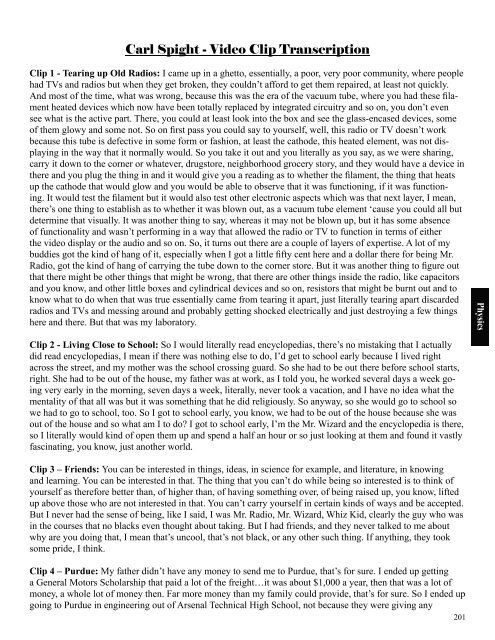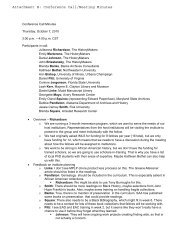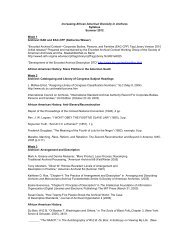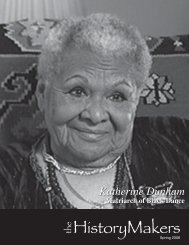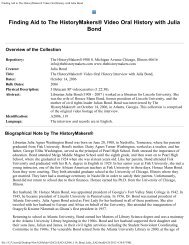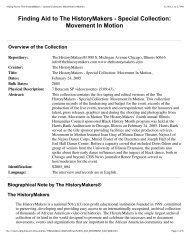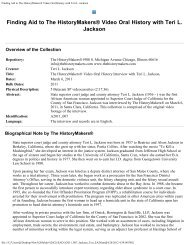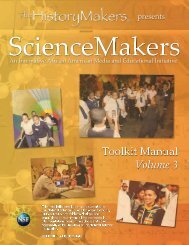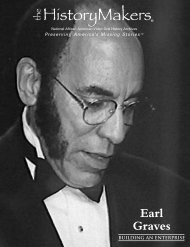ScienceMakers Toolkit Manual - The History Makers
ScienceMakers Toolkit Manual - The History Makers
ScienceMakers Toolkit Manual - The History Makers
Create successful ePaper yourself
Turn your PDF publications into a flip-book with our unique Google optimized e-Paper software.
Carl Spight - Video Clip Transcription<br />
Clip 1 - Tearing up Old Radios: I came up in a ghetto, essentially, a poor, very poor community, where people<br />
had TVs and radios but when they get broken, they couldn’t afford to get them repaired, at least not quickly.<br />
And most of the time, what was wrong, because this was the era of the vacuum tube, where you had these fi lament<br />
heated devices which now have been totally replaced by integrated circuitry and so on, you don’t even<br />
see what is the active part. <strong>The</strong>re, you could at least look into the box and see the glass-encased devices, some<br />
of them glowy and some not. So on fi rst pass you could say to yourself, well, this radio or TV doesn’t work<br />
because this tube is defective in some form or fashion, at least the cathode, this heated element, was not displaying<br />
in the way that it normally would. So you take it out and you literally as you say, as we were sharing,<br />
carry it down to the corner or whatever, drugstore, neighborhood grocery story, and they would have a device in<br />
there and you plug the thing in and it would give you a reading as to whether the fi lament, the thing that heats<br />
up the cathode that would glow and you would be able to observe that it was functioning, if it was functioning.<br />
It would test the fi lament but it would also test other electronic aspects which was that next layer, I mean,<br />
there’s one thing to establish as to whether it was blown out, as a vacuum tube element ‘cause you could all but<br />
determine that visually. It was another thing to say, whereas it may not be blown up, but it has some absence<br />
of functionality and wasn’t performing in a way that allowed the radio or TV to function in terms of either<br />
the video display or the audio and so on. So, it turns out there are a couple of layers of expertise. A lot of my<br />
buddies got the kind of hang of it, especially when I got a little fi fty cent here and a dollar there for being Mr.<br />
Radio, got the kind of hang of carrying the tube down to the corner store. But it was another thing to fi gure out<br />
that there might be other things that might be wrong, that there are other things inside the radio, like capacitors<br />
and you know, and other little boxes and cylindrical devices and so on, resistors that might be burnt out and to<br />
know what to do when that was true essentially came from tearing it apart, just literally tearing apart discarded<br />
radios and TVs and messing around and probably getting shocked electrically and just destroying a few things<br />
here and there. But that was my laboratory.<br />
Clip 2 - Living Close to School: So I would literally read encyclopedias, there’s no mistaking that I actually<br />
did read encyclopedias, I mean if there was nothing else to do, I’d get to school early because I lived right<br />
across the street, and my mother was the school crossing guard. So she had to be out there before school starts,<br />
right. She had to be out of the house, my father was at work, as I told you, he worked several days a week going<br />
very early in the morning, seven days a week, literally, never took a vacation, and I have no idea what the<br />
mentality of that all was but it was something that he did religiously. So anyway, so she would go to school so<br />
we had to go to school, too. So I got to school early, you know, we had to be out of the house because she was<br />
out of the house and so what am I to do? I got to school early, I’m the Mr. Wizard and the encyclopedia is there,<br />
so I literally would kind of open them up and spend a half an hour or so just looking at them and found it vastly<br />
fascinating, you know, just another world.<br />
Clip 3 – Friends: You can be interested in things, ideas, in science for example, and literature, in knowing<br />
and learning. You can be interested in that. <strong>The</strong> thing that you can’t do while being so interested is to think of<br />
yourself as therefore better than, of higher than, of having something over, of being raised up, you know, lifted<br />
up above those who are not interested in that. You can’t carry yourself in certain kinds of ways and be accepted.<br />
But I never had the sense of being, like I said, I was Mr. Radio, Mr. Wizard, Whiz Kid, clearly the guy who was<br />
in the courses that no blacks even thought about taking. But I had friends, and they never talked to me about<br />
why are you doing that, I mean that’s uncool, that’s not black, or any other such thing. If anything, they took<br />
some pride, I think.<br />
Clip 4 – Purdue: My father didn’t have any money to send me to Purdue, that’s for sure. I ended up getting<br />
a General Motors Scholarship that paid a lot of the freight…it was about $1,000 a year, then that was a lot of<br />
money, a whole lot of money then. Far more money than my family could provide, that’s for sure. So I ended up<br />
going to Purdue in engineering out of Arsenal Technical High School, not because they were giving any<br />
201<br />
Physics


